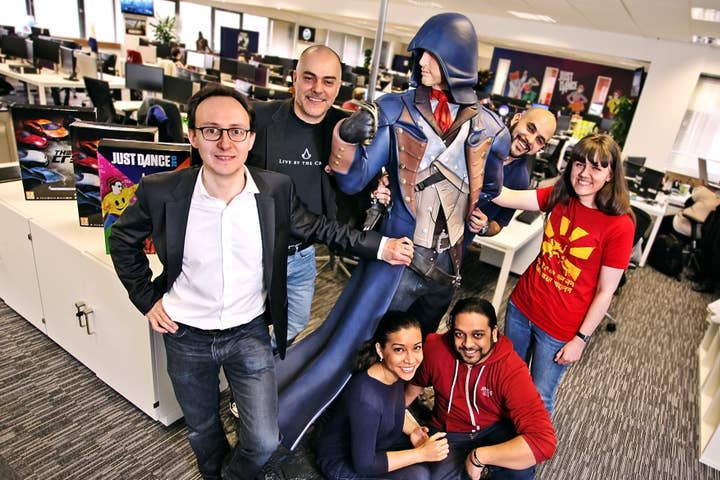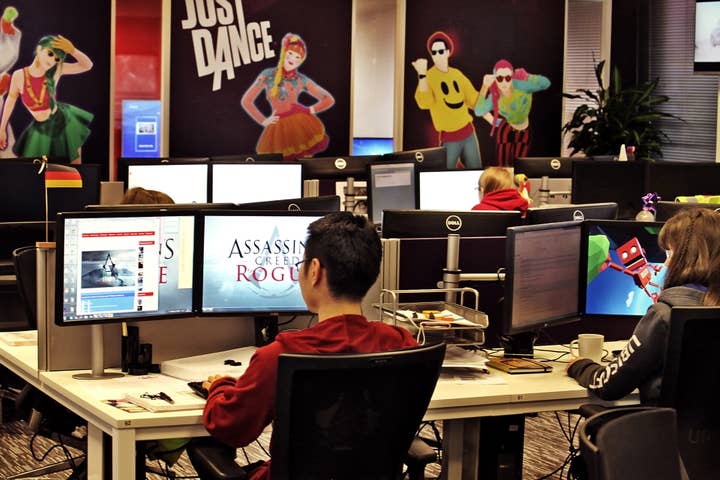“We have a company objective to get closer to our gamers”
Ubisoft opens new international 'Consumer Relationship Centre' in the UK
2014 was a difficult year for Ubisoft, plagued by high-profile technical failures and no small amount of bad feeling among gamers and press alike. The company seems, however, to be more committed than ever to connecting with players; this March it opened a new Consumer Relationship Centre in Newcastle in the UK, dedicated to improving customer support and community management. Consumer Relationship Director Stéphane Catherine spoke to GamesIndustry.biz about the move, and Ubisoft's overall strategy for engaging its audience.
“We have a company objective to get closer to our gamers,” says Catherine. “One of the ways to get there is to build a unified front-line that will give support to our gamers, that will listen to them and will entertain them. That's what the Consumer Relationship Centre is there for.
“In our modern era time goes even faster than it used to. I think gamers want quick feedback and they want an efficient reply, and then what we try to bring on top of that is a shared passion for video games. That's really the vision we have, to share our commitment and passion with our gamers.”
Supporting 11 languages, the CRC covers the entire EMEA (Europe, Middle East and Asia) region as an international hub. Going forward, the plan is to connect more extensively with its American counterpart, creating a 24 hour service where calls made outside of the CRC's opening hours can be automatically redirected to the US.
The centre is indicative of Ubisoft's continued investment in the UK, and in Newcastle in particular, already home to Ubisoft Reflections (Driver, The Crew and most recently Grow Home). With 75 staff employed, and plans to grow that to 100 by the end of 2015 and “probably beyond in coming years” already in motion, the CRC represents significant job creation for the area.
"We chose the UK because it's a very business-friendly environment, and also because the UK is our number one market for the EMEA region"
“When building this project we started with a European-wide scope,” says Catherine. “We chose the UK because it's a very business-friendly environment, and also because the UK is our number one market for the EMEA region.”
Newcastle was chosen partly to create an ongoing connection with Reflections. “It will enable us in the future to build stronger bridges between production and consumer interactions,” he explains. The location also contributed to Ubisoft gaining both local and national government support; attendees at the CRC announcement event in March included Minister for Intellectual Property Baroness Neville-Rofle, and Newcastle City Council leader Nick Forbes, both of whom, among others, aided the project.

Previously Ubisoft relied on a third-party provider in the area, but with the opening of the CRC has now brought its customer support and community management in-house. Catherine sees the internalising of these services as vitally important to the company's approach going forward.
“We want to make our interaction with gamers more integrated,” he says. “By that I mean that the people at Ubisoft who engage with gamers have to be very connected to the whole company. They can't be efficient if they aren't.”
The intention is for customer feedback to be something Ubisoft's developers and production staff have constant, easy access to, allowing it to shape their projects. It's a strategy that can be seen overtly in many of their more recent games - Might & Magic X: Legacy was part of Steam's 'Early Access' program and Ubisoft's own similar 'Open Dev' program; recent Assassin's Creed games have featured an in-game mission rating system, allowing players to score levels they've just played out of five; and for the upcoming Heroes of Might & Magic VII Ubisoft has created the 'Shadow Council', an online community where fans can vote on game features in development.
"Generally speaking the industry as a whole is moving from games to services, and Ubisoft is meeting that challenge"
It's easy to see this as a natural next step of 'games-as-service', a business model Ubisoft has long embraced. Ten or twenty years ago, video games were more often than not 'fire and forget', not supported at all beyond their initial launch period. Now the lifespan of a game extends far beyond that, with companies continuing to monetise their products through updates and DLC for months or years. Open development even allows a game's lifespan to begin before it's released.
Ubisoft has met criticism in some cases for the zealousness of their approach to these concepts: 'always-online' requirements, over-abundant DLC, unreliable Uplay integration and aggressive social media features have all, at various points, generated negative reaction for the way in which they pushed the games-as-services agenda. The company is, however, more dedicated to it than ever.
“Generally speaking the industry as a whole is moving from games to services, and Ubisoft is meeting that challenge,” says Catherine. “What it means in terms of consumer interaction is that our games have much longer activity windows.
“Before launch we organise a beta, like we did for The Crew, and when we do that we have to be there to help our gamers have access to the beta, and we have to be there to listen to them in order to improve the experience. Post-launch we release updates, and every time we do that we have to explain it to our gamers and listen to their feedback, and engage with them.”

It's an approach that makes community-building important, and that's a significant focus of the CRC. In a fast-moving, competitive market, your games are only profitable as services when consumers can be enticed to stick around, connecting with each other and with the company over the game. Finding the best methods of doing that is vital to Ubisoft's business model.
“What defines a community is that it's a set of people who have a shared passion for something, and they have a shared place to engage with that passion,” says Catherine. “We want to give our communities the possibility to engage with us, and with each other, through several destinations. So that can be social media, forums and in-game. We want to get the best of that passion.”
"I think in the future these things will be more integrated with the games, we have to be able to provide support and engagement inside the games themselves"
The benefits of a community extend into customer support too, with players able to contribute to helping each other with technical problems. Catherine calls it “self-help”, though he's keen to stress that “we never want to leave our gamers alone, it's very important that all these activities are supported and accompanied by our community managers and customer support staff."
Ubisoft's customer relationship strategies are a strong indicator for the ways in which support and community management in video games, and the video games themselves, have changed. As the games-as-service model progresses and further dominates, it's likely many other companies will be forced to follow suit; those that haven't already done so. Catherine doesn't see the changes slowing down any time soon.
“I think in the future these things will be more integrated with the games themselves, we have to be able to provide support and engagement inside the games themselves,” he says. “It will be even more influenced by social media, and we're already seeing it influenced by new platforms like Twitch.
“And I'm still asking myself what initiatives such as augmented reality and virtual reality will mean for us.”
